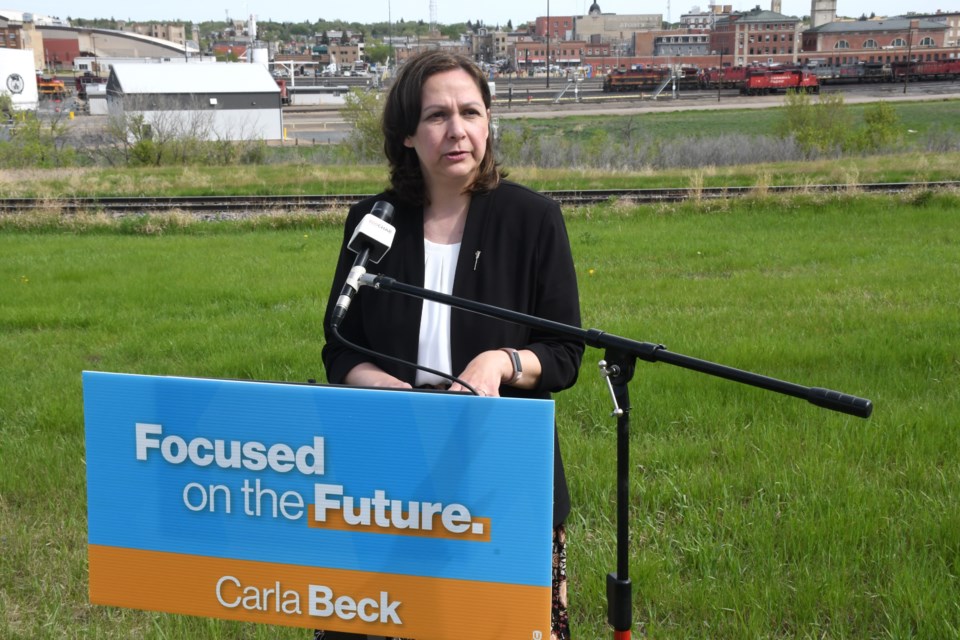MOOSE JAW — The Saskatchewan NDP is raising alarms over what it calls a growing homelessness crisis in Moose Jaw, calling on the provincial government to step up its investment in public housing and support programs.
During a recent visit to her hometown, NDP shadow minister for housing April ChiefCalf said new local data shows homelessness in Moose Jaw has more than doubled in the past year — a trend she blames, at least in part, on Saskatchewan Party policy.
The data published this month in a Point-in-Time Count by Square One Community Inc. in collaboration with Métis Nation–Saskatchewan, estimates that between 76 and 150 people in Moose Jaw are currently unhoused, up from 26 in the 2023 count. Roughly half of those surveyed said they first experienced homelessness before age 30.
“I thought Moose Jaw would be a community untouched by this,” said ChiefCalf, who represents the riding of Saskatoon Westview. “But really, we’re seeing a rise in houselessness across the province.”
She pointed to what she described as chronic underfunding in housing, income support, and social services, and took particular aim at the 63 vacant Saskatchewan Housing Corporation (SHC) units in Moose Jaw. A Freedom of Information request from the NDP revealed that only five of those units are available, with the remainder reportedly uninhabitable due to maintenance issues.
“That might seem like a small number, but with 150 people homeless in Moose Jaw, that’s 58 units where people could be living,” she said. “It raises a bigger question: Why are these units out of commission?”
ChiefCalf also criticized what she called insufficient increases to the Saskatchewan Income Support (SIS) and Saskatchewan Assured Income for Disability (SAID) programs, saying benefits have not kept pace with inflation or rental rates.
Asked what her party would do differently, she said an NDP government would focus on reopening and renovating vacant housing stock, while fostering better collaboration between provincial and municipal governments.
“There’s a real lack of consultation right now,” ChiefCalf said. “Governments need to work together — not in silos — to find real, local solutions.”
She emphasized that housing is a foundational issue that intersects with public safety, crime, and mental health.
“We talk a lot about getting tough on crime,” she said. “But from the NDP position, we also talk about getting tough on the causes of crime — like poverty and lack of mental health supports.”
Province defends its approach
In response, the Ministry of Social Services said it is actively working with local organizations, Indigenous partners, and other levels of government to improve outcomes for those experiencing homelessness in Moose Jaw and across the province.
“Over the past two years, we have developed 141 new emergency shelter spaces, 155 new supportive housing spaces, 30 new complex needs emergency shelter spaces, and introduced new street outreach and safety responses,” a ministry spokesperson said in an emailed statement.
“In collaboration with our partners, the Government of Saskatchewan has delivered on its commitments laid out in our Provincial Approach to Homelessness (PATH) and provided a foundation to collaborate with our partners and be flexible to respond to arising needs.”
Locally, the ministry pointed to the addition of 15 new emergency shelter spaces at Willow Lodge, operated in partnership with the John Howard Society. The province says these beds are available year-round and that individuals in need of shelter can access help through income assistance offices or, after hours, by contacting the local RCMP.
The province also highlighted a $5-million investment in its Rental Development Program in the 2025-26 budget, aimed at creating new supportive housing units. In total, $88.4 million is being invested this year in repairs and maintenance for rent-ready housing across Saskatchewan, including in Moose Jaw.
“This will support the repair of up to 1,600 provincially owned housing units and provide 350 more households with affordable housing this year compared to last year,” the ministry said.




